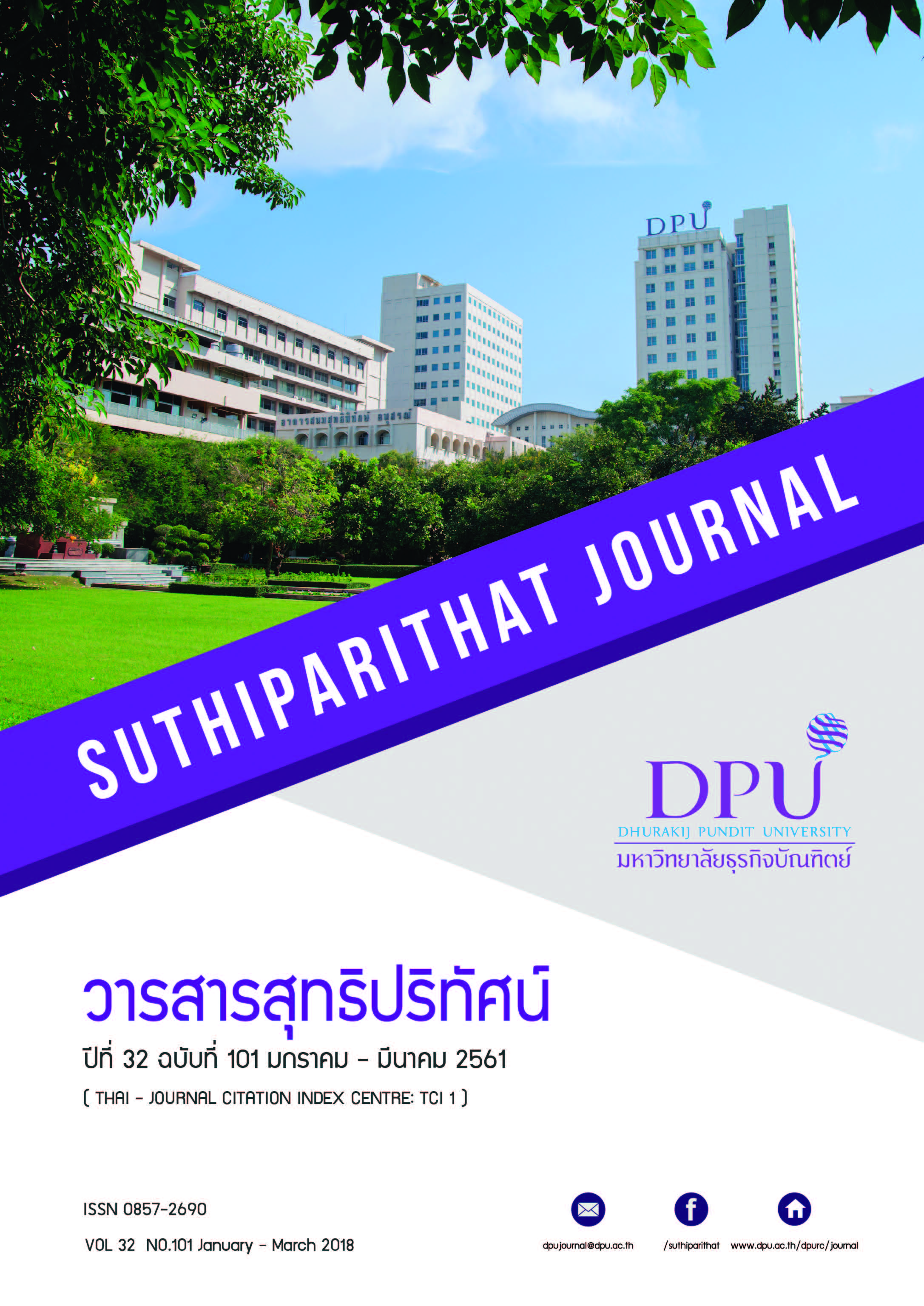ปัจจัยที่มีอิทธิพลต่อผลลัพธ์ทางสาธารณสุข: กรณีศึกษาประเทศกลุ่มรายได้ปานกลางและต่ำ
คำสำคัญ:
อัตราการตายของเด็กก่อน 5 ขวบ, Panel Data Analysis, Random Effect, การสาธารณสุขเชิงป้องกันบทคัดย่อ
งานวิจัยชิ้นนี้มีวัตถุประสงค์เพื่อวิเคราะห์ปัจจัยที่มีอิทธิพลต่อผลลัพธ์ทางสาธารณสุข (อัตราการตายของเด็กก่อน 5 ขวบต่อจำนวนประชากร 1,000 คน) โดยใช้ข้อมูลทุติยภูมิจาก 139 ประเทศที่มี รายได้ปานกลางและต่ำในระหว่างปี 1996 – 2015 เป็นแหล่งข้อมูลดิบ ซึ่งใช้วิธีการ Panel Data Analysis ในการวิเคราะห์ ผลปรากฏเป็นที่น่าพอใจเมื่อพบว่า ตัวแปรที่ใช้ทำการศึกษามีลักษณะเป็น Panel Cointegration ซึ่งหมายถึงการมีความสัมพันธ์ระยะยาวของตัวแปรที่ใช้ศึกษาและเมื่อทดสอบแบบจำลองด้วยวิธี Random Effect พบผลที่เป็นไปตามทฤษฎีกล่าวคือ การสาธารณสุขเชิงป้องกัน (อัตราการปรับปรุงสาธารณสุขขั้นมูลฐานในชนบท และอัตราการได้รับวัคซีนสำคัญของเด็กอายุ 12-23 เดือน) การควบคุมการทุจริต อัตราการเข้าศึกษาต่อในระดับมัธยมศึกษาตอนต้นรวมถึงรายได้ต่อหัวประชากรมี ผลทำให้จำนวนเด็กก่อน 5 ขวบที่เสียชีวิตลดลงอย่างมีนัยสำคัญทางสถิติ
เอกสารอ้างอิง
Ainsworth, M., Beegle, K., & Koda,G. (2002). The impact of adult mortality and parental deaths on primary school enrollment in Northwestern Tanzania. Journal of Development Studies, 41(3), 412-439.
Alderman, H., Behrman, J. R., Levy, V. & Menon, R. (2001). Child health and school enrollment: A longitudinal analysis. The Journal of Human Resources, 36(1), 185-205.
Breitung, J. (2001). The local power of some unit root tests for panel data. In T. B. F. Badi, H. Baltagi, R. Carter Hill (Eds.), Nonstationary panels, panel cointegration, and dynamic panels (Advances in Econometrics) (pp. 161-117). Bingley, UK: Emerald Group Publishing.
Gupta, S., Davoodi, H. & Tiongson, E. (2000). Corruption and the provision of health care and education services. Washington, DC: International Monetary Fund.
Gupta, S., Verhoeven, M.& Tiongson, T. (1999). Does higher government spending buy better results in education and health care?. Washington, DC: International Monetary Fund.
Hausman, J. A. (1978). Specification tests in econometrics. Econometrica, 46(6), 1251-1271.
Houeninvo G. Hilaire (2014) Does good governance improve public health expenditure-health outcomes nexus? New empirical evidence from Africa. Revue d’Economie Thorique et Applique, 4(1), 1-24.
Kao, C., & Chiang, M.-H. (1999). On the estimation and inference of a cointegrated regression in panel data. In Badi H. Baltagi,Thomas B. Fomby, R. Carter Hill (Eds.). Nonstationary panels, panel cointegration, and dynamic panels (Advances in Econometrics, Volume 15) (pp.179-222). Bingley, UK: Emerald Group Publishing.
Kaufman, D., Kraay, A., & Mastruzzi, M. (2004). Governance matters III: Governance indicators for 1996, 1998, 2000, and 2002. World Bank Economic Review, 18(2), 253-287.
Kaufman, D., Kraay, A., & Zoido-Lobaton, P. (1999). Governance matters. Washington, DC: Development Economics Research Group, World Bank.
McIntyre, D. & Mooney, G. (2007). The economics of health equity. Cambridge: Cambridge University Press.
ดาวน์โหลด
เผยแพร่แล้ว
รูปแบบการอ้างอิง
ฉบับ
ประเภทบทความ
สัญญาอนุญาต
เนื้อหาและข้อมูลในบทความที่ลงตีพิมพ์ในวารสารสุทธิปริทัศน์ ถือเป็นข้อคิดเห็นและความรับผิดชอบของผู้เขียนบทความโดยตรงซึ่งกองบรรณาธิการวารสาร ไม่จำเป็นต้องเห็นด้วย หรือร่วมรับผิดชอบใด ๆ
บทความ ข้อมูล เนื้อหา รูปภาพ ฯลฯ ที่ได้รับการตีพิมพ์ในวารสารสุทธิปริทัศน์ ถือเป็นลิขสิทธิ์ของวารสารสุทธิปริทัศน์หากบุคคลหรือหน่วยงานใดต้องการนำทั้งหมดหรือส่วนหนึ่งส่วนใดไปเผยแพร่ต่อหรือเพื่อกระทำการใด ๆ จะต้องได้รับอนุญาตเป็นลายลักษณ์อักษรจากวารสารสุทธิปริทัศน์ก่อนเท่านั้น







